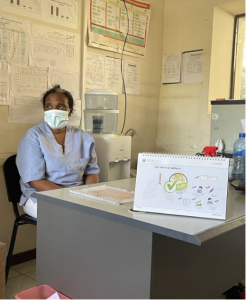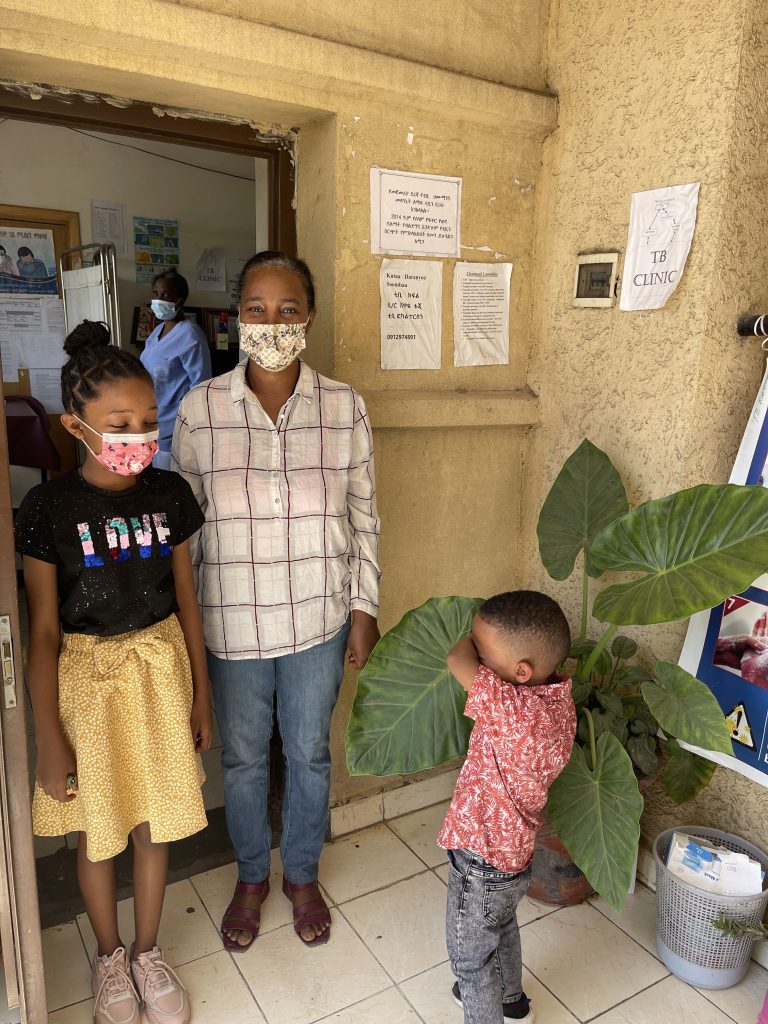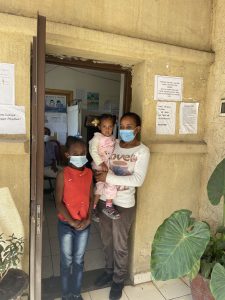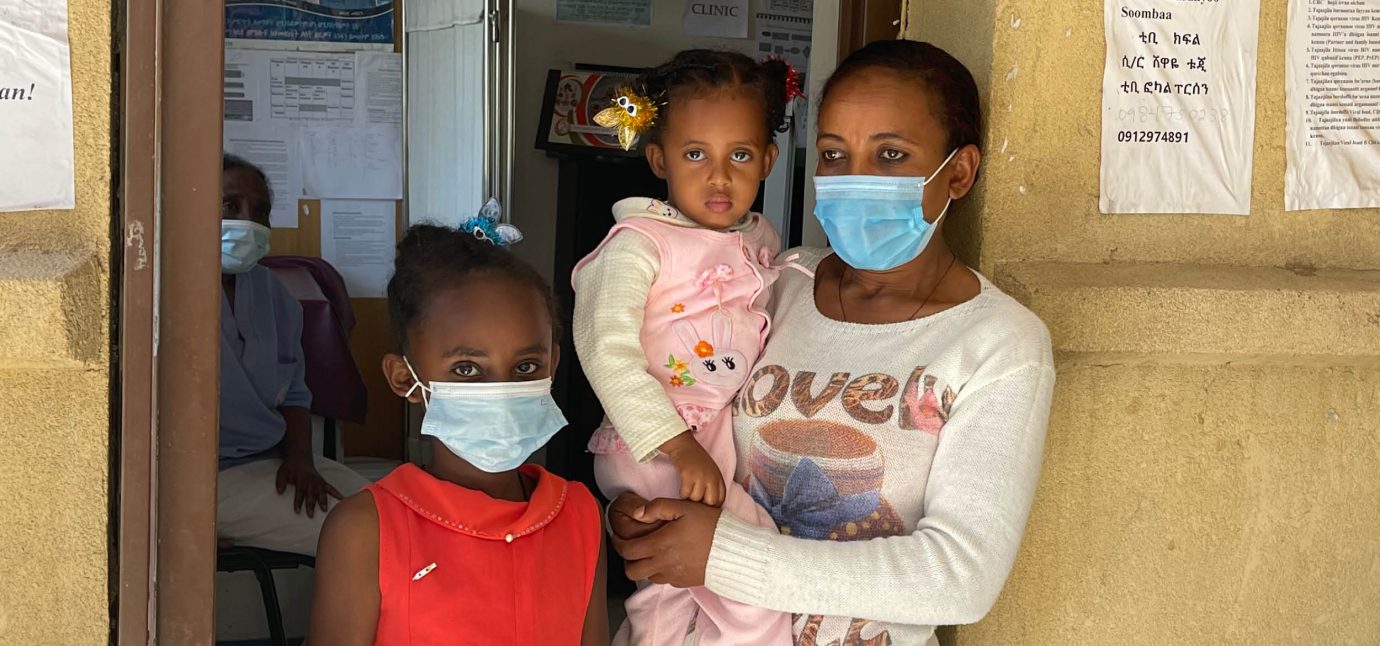About a quarter of the world’s population is infected with Mycobacterium Tuberculosis and thus at risk of developing tuberculosis (TB) disease. TB infection (TBI) is the reservoir of a TB epidemic. Expanding the access to and the awareness of Tuberculosis Preventive Treatment (TPT) is essential to meet global End TB targets – which is the very core of the Unitaid-funded IMPAACT4TB project. That’s why we would like to share a couple of personal experiences with the relatively unknown and sometimes low-available TPT.
Ethiopia was selected as one of the 12 countries to implement the Unitaid-funded IMPAACT4TB project. Since August 2020 KNCV Tuberculosis Foundation has been the lead in implementing the project in Ethiopia. Below you will find the personal experiences of a care giver and two mothers with TB Preventative Treatment for under-15-year-old children.
The perspective of a care provider on the new, shorter TPT
First off, we spoke to Sr. Shewaye, TB focal person and care provider in Bishoftu Hospital in Addis Ababa, Ethiopia. ‘It has been a year since I started working in this TB clinic. I preform contact investigations for index TB patients with active infectious TB by making a list of family members – including household and close contacts – and asking the index patients to bring them to the hospital for a TB screening. Previously, a daily administered Isoniazid would be assigned to child contacts of bacteriologically confirmed index case for six months. But now, we administer for only three months; a weekly drug of 3HP (Isoniazid & Rifapentine) for 2–15-year-old children and a daily 3RH (Rifampicin & Isoniazid) for children under two years old.’

Shewaye claims it can be challenging to convince a family to give drugs to a healthy child on a daily basis. ‘It was particularly difficult to convince them to give the medication for six months. Now, after the short course drugs have been introduced, it is easier to convince a family to start the prophylaxis.’
‘While all types of treatment recommended by WHO for TB infection are effective, healthcare providers should prescribe the more convenient and shorter regimens whenever possible,’ Shewaye adds. ‘Patients are more likely to complete a shorter treatment regimen.’
Asking Shewaye if she sees any downsides to the innovative and short regimen, Shewaye says she has not observed any side effects among her patients taking Isoniazid and/or Rifapentine. ‘Since I started working here, however, the challenge I sometimes face is a drug shortage of either rifapentine, isoniazid (INH) 100 mg or Vitamin B6 as I dispense loose tablets.’
Mekdes had doubts, but is now advocating for TPT
Secondly, we spoke to Mekdes, a mother of two. ‘I was diagnosed with TB by GeneXpert in Addis Ababa. At that time, the TB focal point at the hospital informed me that my two children must be assessed for active TB disease and provided with TB Preventive Treatment if they did not have active TB disease. I brought them to TB clinic and fortunately both of them got screened negative for active TB.’

‘I was counseled on TB preventive treatment for my children,’ Mekdes continues. ‘I agreed and took the daily administered medication home for my four-year-old child the same day. However, I was not convinced enough… So, I informed my husband, who lives abroad. He wasn’t convinced yet either. I turned to other health professionals for their view on TPT. First, I consulted a health professional working in another facility, he told me “How can they give you drugs for a healthy child? This is not right!’ Based on that, I decided not to give the treatment and stored it at home.’
I went back to Addis Ababa to seek advice from another doctor,’ Mekdes goes on says. ‘He informed me “This drug helps the child prevent further progression of TB. So, you have to start giving it”. When I went back to my nurse in Bishoftu Hospital I told her I didn’t start the TPT yet. I explained my reasoning and apologized. She again counseled me and I started giving my child the treatment. I haven’t observed any side effects while he was taking his medication. My other child started the preventive treatment a month later. She takes it every week and is doing well very well.’
Mekdes says she had been experiencing TB symptoms for a month before the disease was diagnosed. ‘I believe that if there’s treatment for prevention, it is better to take it than to wait and worry about whether your children will catch it or not. I personally encourage others to provide their children with TPT, just like I did.”
Genet: ‘I feel relieved knowing the children were able to start TPT’

Lastly, we talked to Genet, whose husband was diagnosed with active TB. They have two children. ‘My husband was sick for around two months before TB was identified. When my husband started his TB treatment at Bishoftu Hospital, he was told to bring the family members including his children for a checkup. The TB focal person informed us that all children that live with a TB patient, that show no symptoms of TB themselves, should start TB Preventative Treatment.’
Genet admitted she was worried about the health of her children. ‘We all live in the same house, and the children are close with their father. So, we decided to let the children get this preventive treatment. I brought both children back to hospital to start the treatment. Our elder girl started the weekly administered treatment for three months and completed it. Our younger daughter took the took a daily administered treatment for 3 months and also finished it.’
‘I feel relieved knowing the children were able to start TPT,’ said Genet gratefully. ‘I thank the nurses for counseling us and initiating the treatment. I am very glad that we all came to the hospital and got screened negative, our children got the preventive treatment and that my husband completed his TB treatment.’
Read more about the IMPAACT4TB project.

